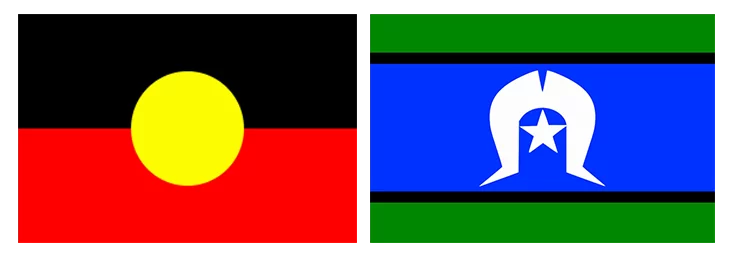June 2025
Lenie Carswell is a remarkable woman—quiet, soft-spoken, fiercely independent, resilient, tough, and funny! She gets things done and has developed lifelong friendships.
Lenie, who turned 79 in May, has had an interesting life. She is a Life Member of Little Haven Palliative Care and has been a Little Haven volunteer for over 30 years.
Born in Holland, her family migrated to Australia in 1951 when she was four years old, after the war had finished. Her father got a job working for a Dutch farmer in Australia, and the family of five settled in a small town called Allies Creek, which is located near Mundubbera. Originally a sawmill, it had become a farming community. It had one little convenience store, which was in a bedroom.
“The woman I have admired most in my life is my mother,” Lenie says. “When she first came to Australia, she didn’t know how to drive and lived in a shed with a dirt floor—making it livable for three kids and a husband.” Four more babies came along, making Lenie the oldest of seven children.
Her mother was both resilient and reliable. Whenever something needed to be done or someone needed assistance, her mother was always there to help. Lenie inherited these qualities. She believes the women of her mother’s era were simply amazing!
Lenie became a nurse at 17, following in the footsteps of her mother, who had been a nurse during the war.
At age 15, Lenie’s father asked what she wanted to be. She said she wanted to be a hairdresser. He said, “You’re not going to be a hairdresser and fiddle with people’s hair.” She is amused that she’s been fiddling with people’s bums instead of their hair for all these years!
Lenie met her future husband, Trevor Carswell, at a country dance one Saturday night. She tells me the local lads would turn up as the town pubs were closing, have a beer from their car boot, and try to impress the females inside the dance hall. The women would sit around the hall’s perimeter and wait for the men to come in and ask them to dance.
On this occasion, Trevor said to his mates, “I’m going to walk around the hall tonight and ask every female here if I can take her home.” He was about three-quarters of the way around the hall when he reached Lenie and asked, “Can I take you home? “She replied, “No,” and as he turned to move on to the next girl, she added, “But you can pick me up on Monday night. “He asked, “How will I know?” “It will be fine; just ring the doorbell at the nurses’ quarters.”
Meanwhile, Lenie checked out who this Trevor fellow was before Monday night and was waiting for him when he arrived. She says he thought he was a bit of a gallivant, but we proved him wrong; we got married two years later. “I think now how rude I was to suggest he pick me up on Monday night, but it turned into 56 years of reasonably good days and nights of marital bliss.”
Trevor and Lenie’s 1968 wedding was the first in several years, and lots of people wanted to attend. Many people, including the Dutch minister and his wife, travelled from Sydney for the happy occasion. Everyone went to bed on Thursday evening, the night before her wedding. The minister and his wife were in the girl’s bedroom, Mum and Dad were in their bedroom, and Lenie was sleeping in the sewing room on a stretcher. At 11 o’clock that night, her mother came in to tell her that Dad had died. “Are you sure?” Lenie asked. “Yes,” her mother replied. Not knowing what to do, Lenie called the hospital superintendent for advice. He told her to ring the Undertaker and the Police.
Her father had not been ill; he just had a massive heart attack and died at age 52.
Ironically, Lenie had delivered a baby earlier that day – it turned out to be the wife of the policeman who came to stay until her father’s body was removed. The policeman felt bad that he was there in such an official, sad capacity.
Their wedding was postponed until Sunday. The guests were already there for the wedding, so the funeral was held on Saturday, the wedding on Sunday, and life went on.
Lenie stopped working as a nurse when she became pregnant with her first child. Her daughter, Jodi, was born in 1970, and her son, Peter, in 1972.

Lenie became a stay-at-home mother, feeling fortunate because her husband, Trevor, had a successful house painting business, providing a good income; she didn’t need to work. (Trevor earned $52 per week compared to her income of $22 per week.)
The next 20 years were spent raising the children and donating her time and talents to the Red Cross, Blood Bank, Meals on Wheels, Pony Club, Swimming Club, Ballet, various school committees, and Little Haven. Lenie says there are many jobs that you don’t get paid for, but you do them to feel good about yourself. She said there was always more needed.
Lenie has a wonderful family and friends, and would call upon them to help with these various efforts. What was her secret to getting things done? Calling upon the friends she knew would help; they would help because she asked them to.
When the ‘kids were off my hands’, she says with a cheeky grin, Lenie returned to work—not because she needed the money but because she enjoyed what she did and wanted to help and make a difference.
The nursing profession had changed over the 20 years she had been away, so she attended a 12-week re-entry course in Gympie. The hospital wanted her to work in the ICU, so she undertook another training course at Prince Charles Hospital, learning how to care for cardiac patients. She then returned to Gympie and worked in the ICU.
Having grown up in Mundubbera and Goomeri, west of Gympie, Lenie wanted to do something ‘rural’ – feeling the guidance of her mother, who was the woman she admired most in her life. She said she would retire if they didn’t let her go outback. At the time, Queensland State Health was hiring nurses to serve in rural and remote areas and primarily work independently. Specialist doctors would periodically fly in and do a clinic for a day at the site before returning to Brisbane. She would be on her own as the nurse the remainder of the time, supported by information in a Royal Flying Doctor Service booklet.
She returned to the Prince Charles Hospital for five days of training, during which she learned suturing and other techniques that could be used in the outback without the support of a doctor. “We learned how to suture on a pig’s trotter because pig skin, valves, and pig’s everything are very much like ours. (I’m pleased we have a different diet, though, because it would be a bit much to eat what a pig eats!)”
From 2003 to 2005, Lenie served 36 weeks as the local nurse in 6 rural and remote locations: Woorabinda, an Aboriginal community; Longreach and Charleville, Quilpie and Weipa near the top end, and finishing up again in Woorabinda. Each posting was for six weeks, during which she was on her own, supported, when necessary, by the Royal Flying Doctor Service.
Upon her arrival at Woorabinda, her first posting, a four-hour drive west of Rockhampton, she was welcomed not with a cup of tea but with an XXXX stubby, which she happily drank! Lenie says she made it her business to get along with people. When asked if she felt safe while working and living in these remote locations, she told me the Woorabinda clinic was next to the Police Station, so she felt secure. Ironically, she later learned that the locals had burned down the Police Station.

“Kids would come in being hit by a stone coming off a slasher. Out there, you made do with what you had because doctors weren’t going to travel 500 miles to put two stitches in. And the patient wouldn’t travel 500 miles in the back of a Toyota van to have their leg wrapped up. So, people made do. It wasn’t because they were tougher than anybody else; it was just how it was. You have to do what you can with what you’ve got.”
Lenie has lots of amusing stories about her Outback nursing experiences.
“Once, while I was working in Quilpie, the ambulance called around 1 o’clock to inform us that they were bringing in a patient who had been bitten by a snake. The patient was asleep upon arrival, and we placed him in the ICU. He woke up the next morning and asked, “What am I doing here?” “You were bitten by a snake.” “When?” “Last night.” “No, I wasn’t.” “Yes, you were.” “How do you know?” “Because you were disoriented and speaking in uncontrollable, inaudible bursts.” “Missy, I wasn’t bitten by a snake; I was f***king drunk!” “So, we packed him up and sent him home!”
“There was a lovely fellow named Dexter in the nursing home section of the hospital in Woorabinda. He was an ugly fellow – as ugly as you couldn’t believe! But I got on with him well because I treated him the way he treated me. Someone told me he had a steel plate put in his skull because he fell off his horse. While giving him his tablets one day, I asked how did you go when you fell off the horse?” “I didn’t fall off a horse; I fell off the bloody bar stool!” “He was drunk. It was funny the way he told the story so matter-of-factly!”
Lenie enjoyed working with the remote families, saying people there have it tough, but they also have a purpose. Some farms have been in the family for 150 years, so people have meaning and make it their business to get on with each other and help each other out when needed, versus city people who don’t know who their neighbours are, even though they may have lived next door for 50 years. “I enjoyed what I did because it was different, and I enjoyed meeting different people”.
Leni appreciated her life with Trevor. “My husband was a wonderful man. He let me do what I wanted to do. Sometimes, he had to help me pay for it because he made more money than I did! I travelled overseas about 9 or 10 times. He helped pay for that. He never said I couldn’t do anything, but he didn’t want to go with me. If we went past Bells Bridge, he’d get homesick. Why have two people being unhappy? He was a man before his time.”
Lenie was diagnosed with Parkinson’s disease at age 64. She thought she may have had Parkinson’s before being diagnosed, but she wanted to accompany her daughter and granddaughter overseas for a soccer tournament they were competing in and didn’t want to start medication while she was away.

Upon returning home, she went to the doctor, who confirmed her suspicions that she did, indeed, have Parkinson’s Disease. The doctor told her the first 10 years are a breeze, but after 10 years, things will become more and more difficult, and the doctor was right. She probably had Parkinson’s for four years before she was diagnosed.
Lenie started a local Parkinson’s Support group as Gympie had no help. They started the group with six people and ended up with 70. Of the original six, Lenie is the only one remaining, and her daughter, Jodi, continues to coordinate the group.
Because of her Parkinson’s, Trevor became Lenie’s carer, doing all the grocery shopping, cooking, cleaning, medication management and showering. This changed overnight. Sometimes life goes full circle – it certainly did in Lenie’s case.

Trevor experienced a cough and pain in his left lung and was diagnosed with mesothelioma in February 2024. He remained asymptomatic until 2 September 2024, when he experienced a rapid decline and died on 1 October 2024.
Per Trev’s wishes, Lenie and her family cared for him at home. They set up the lounge room with a hospital bed, chair, commode, etc. Trev was registered with Little Haven, and for 26 days, the Little Haven Team supported them from day one. Lenie and her family took care of his nursing needs. The Little Haven Team prepared his syringes for pain relief. Although it was difficult for the family, the respect and understanding of the Palliative Care Nurses made it easier.
It took Trevor three weeks to die. Lenie, Jodi, Peter and a friend nursed him in their lounge room. They bathed him, fed him and comforted him. He died without a skin sore, which pleased Lenie immensely. She said to die with a bedsore is inhumane, in her opinion.
Of all the nursing fields she has experienced during her career, including ICU, maternity, and paediatrics, palliative nursing is the most challenging yet the most rewarding. She isn’t sure if this is because her patient was her husband.
Lenie says, “I never envisaged relying on the staff of Little Haven when we were first setting up the organisation. It made me feel important to know that I was one of the helpers involved in setting up Little Haven as we know it today. I had never thought about working in Palliative situations, and when the necessity arose, I felt happy with the support of the Little Haven staff. They answered the call in the middle of the night in a friendly manner and were able to help in such a way that neither of us was intrusive in each other’s territory. I never realised how much time is required to nurse someone at home at the end of life. I didn’t realise how tiring it was. Being a nurse did not prepare me for that.”
“I never realised the effort involved in nursing somebody dear to you and with no hope of living. It is difficult to love someone while they are dying and to disassociate your feelings of anguish from the reality of not living. I have heard it said that people aren’t afraid of dying – just the road to it. I can say with all honesty that Jodi, Peter and I shared the anguish of the journey to Trev’s death. I was very fortunate to have the total support of my family, extended family and friends. To think you can do so much on your own is a false belief because no one can stand alone and still cope with the duress of having to lose a loved one.”
The stress of looking after her husband has exacerbated her Parkinson’s symptoms. Lenie lives in her family home with the support of her family. Her grandchildren visit daily. She has a My Aged Care Package and support services to help her maintain her home. She looks after her medications, which are taken 9 times a day. She keeps her mobile phone with her and wears a fall alarm alert. She prepares her meals or can have them supplied. She has difficulty with slowness because of Parkinson’s.
“One copes because one must,” she says. Lenie feels she is coping competently.

Leni and Trevor with Grandchildren Jack, Annika, Micah and Lilly.
“We were blessed with the help of Little Haven, and we realised quickly that we couldn’t have been able to carry out Trev’s wish of dying at home comfortably without them.”
Leni wishes to thank the staff of Little Haven, from the administration, the nurses, to Sue Manton, the CEO, for their professionalism, kindness, and much-needed help.
“Life is only as difficult as you allow it to be. It’s not easy to die; I’ve discovered that. It’s easier to live than to die.”
Leni pictured here with Linda McMullen Little Haven Biography








